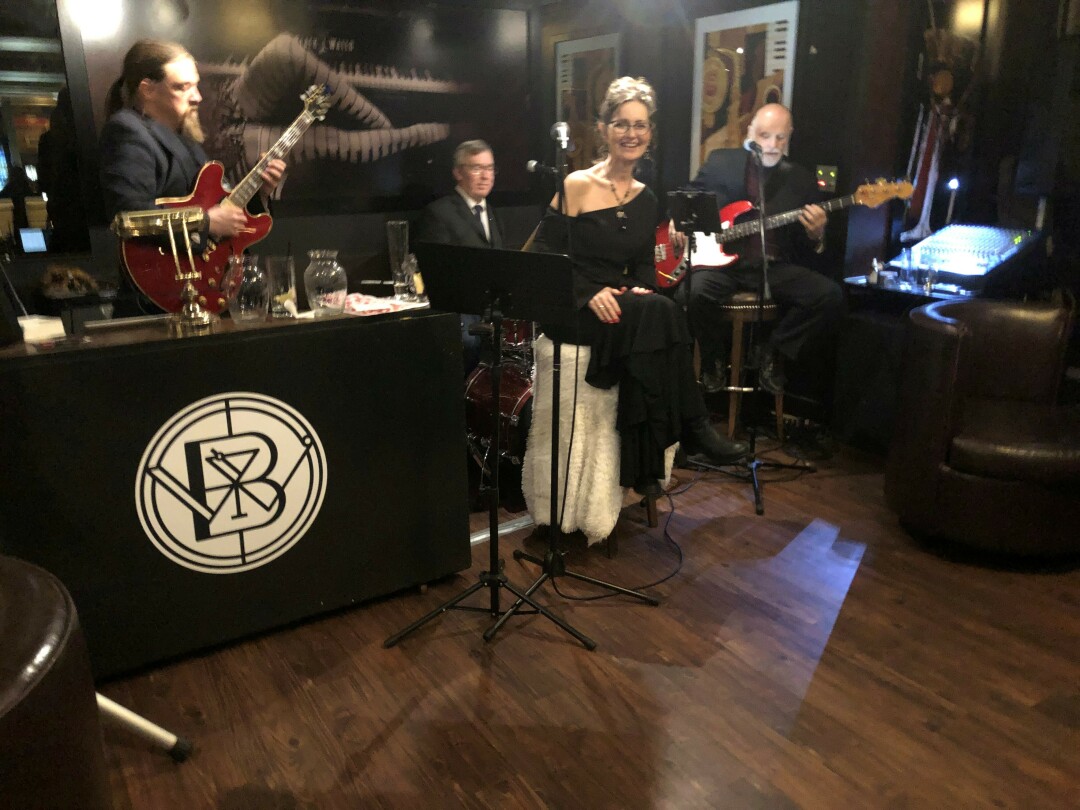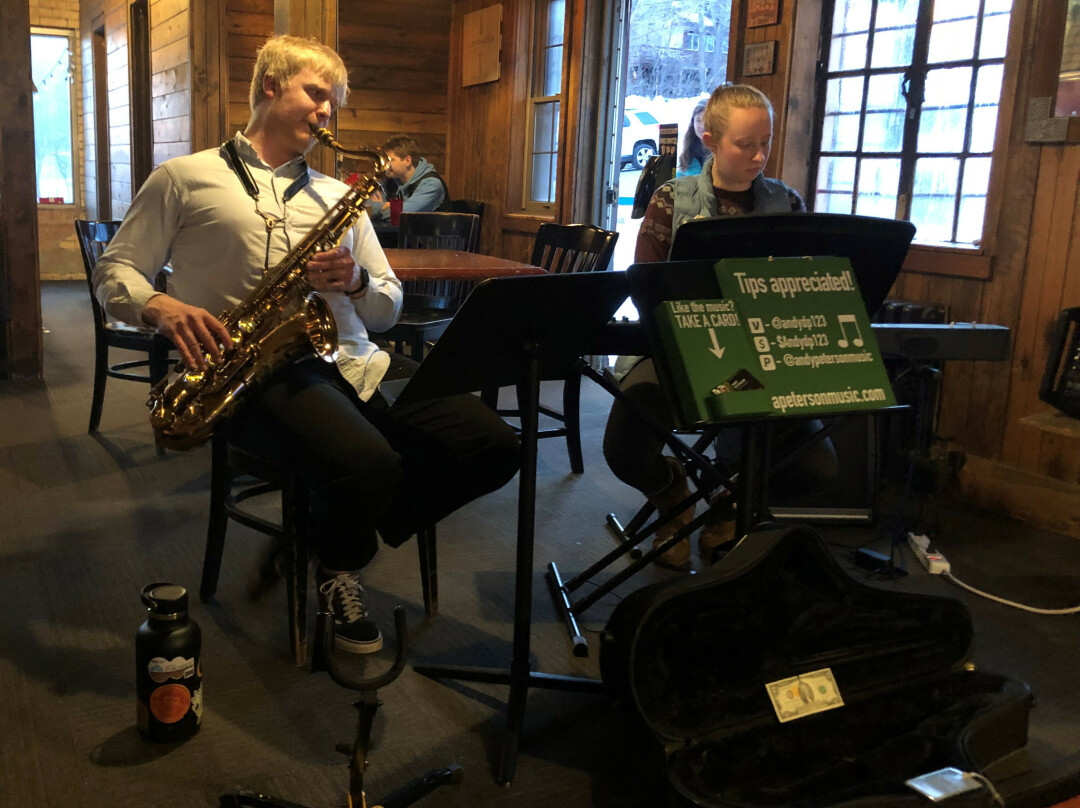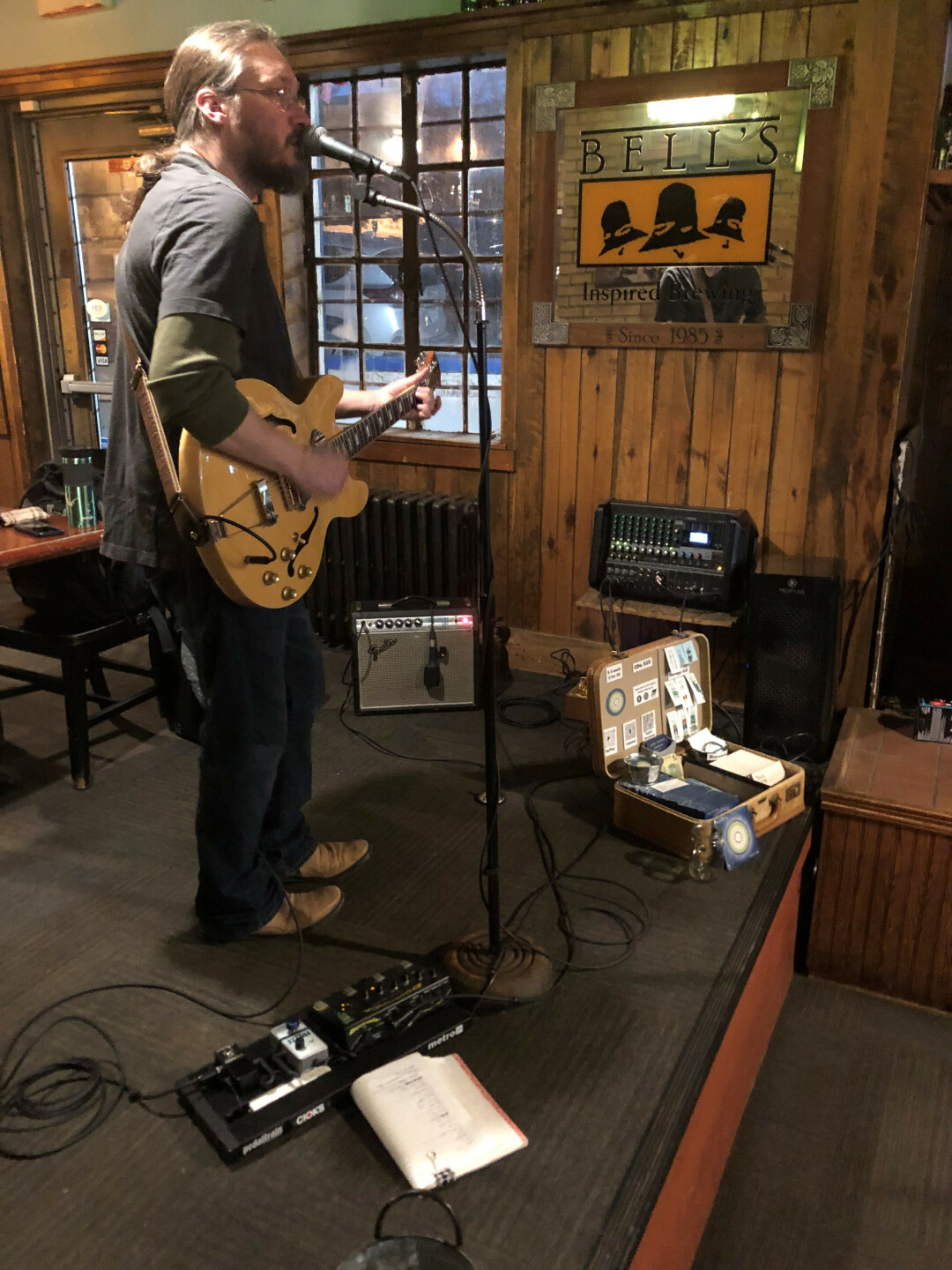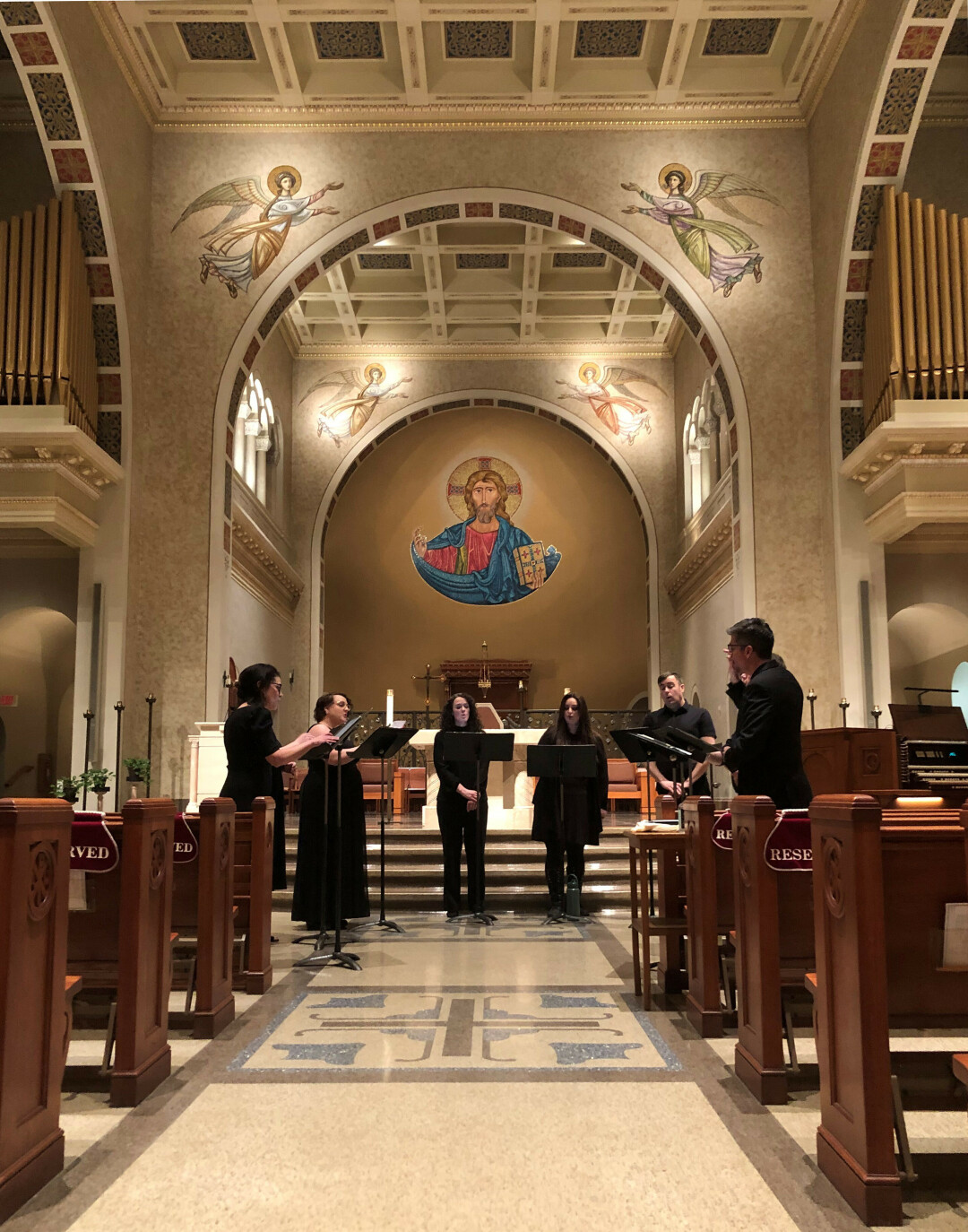From the profane to the sacred

The Maxi Child Trio at the classy Black Water Lounge. Photos by Jill Fisher.
So much is happening on the music scene hereabouts I feel pressed to take in as much as possible (shades of Homegrown). Well, it was bound to happen sooner or later – a poor review of a Sacred Heart event.
It was the Feb. 14, Valentine’s Day concert by Haley. She has played this venue before and recorded here, but this was the first I’ve ever heard or seen her.
Playing both electric guitar and piano, Haley performed original songs from her latest album. It was the subject content of her songs I had a hard time with. The lyrics were dark; so much so I would have billed it as an “anti-valentine show.” Songs like “You Used To Say I Love You” were plentiful. One called “Suicide” made several folks cringe.
While she undoubtedly has a beautiful voice, her guitar strumming was nothing special, the melodies forgettable and her too long-held notes hard on the ears at times (something many vocalists are wont to do). Haley’s powerful voice sans amplification would have been better suited to this venue.
Accompanying Haley was Steve Garrington, who played both electric bass guitar and keyboards. In addition, he controlled a metronome-like electric drumbeat, another aspect of “live” music I take issue with. At times it seemed he had a difficult time coordinating his riffs with her lead.
Although I missed most of the opening act for this concert – Tender Ness (Peter Witrak) – what I did hear was quite nice. He played electric keyboards, acoustic guitar and piano and sang some songs in French. Late in the concert he had his mother join him on stage for a few songs and then Haley as well for a rendition of Joni Mitchell’s “Woodstock.”
The audience for this SHMC concert was small but seemed to receive both acts positively based on the applause. In speaking with others, who had heard Witrak before, I found they were not entirely thrilled by this performance – a testament to the fact that there are myriad tastes in music which is a good thing.

Andy Peterson and Analise Levesque at Sir Benedict’s.
On Wednesday, Feb. 15, I took in the performance by saxophonist Andy Peterson at Sir Benedict’s. Analise Levesque accompanied him on keyboards; together they played jazz standards for two hours, with virtually no break. Their rendition of “Autumn Leaves” was particularly nice.
All of their music provided a soothing background for those who were there primarily to eat and socialize. Like other jazz musicians I’ve spoken with, Peterson said he didn’t mind the background conversations, noting that jazz was first played and developed in just such situations.
Peterson will be headed to the Big Apple in the not-too-distant future, so do get out to see him in the next couple of months if you enjoy jazz.
Later that same evening, I made it over to Cedar Lounge in Superior to hear one of my favorites, Misisipi Mike Wolf, who, on this evening, was joined by Breanne Marie during his first set and by Clancy Ward in the second.
Breanne and Mike played some Hank Williams covers, along with “Jackson” and “We’re Not The Jet Set,” a cover of the John Prine and Iris DeMent duet. You could tell they were having a good time and were fun to hear.
Mike obliged the crowd when they wanted to hear his humorous originals, “Number Two” and “Tattoo.” Later, when they asked for other requests, I called for a Little Richard tune (a request I make of every musician and band that announces they take them) and was pleasantly surprised that Mike and Clancy complied!

Nick Foytik
The next night, Thursday, Feb. 16, it was back to Sir Ben’s to hear Nick Foytik, soloing with his hollow body Epiphone Casino electric guitar. He produced a great sound, similar to Charlie Parr’s. As he was billed as performing in the blues, folk, soul and rock and roll traditions (in other words, Americana), this similarity was not surprising.
He covered some great tunes such as “I Gotta Woman,” “It’s All Right,” Creedence Clearwater Revival’s “Green River,” Johnny Cash’s “Folsom Prison” and, one of my favorites as sung by Phoebe Snow, “Let the Good Times Roll.”
His originals were good too, including “On My Way,” so much so I purchased his latest CD, About Time, which I have enjoyed listening to.
Foytik hails from Phillips, Wis., (site of the Fred Smith Concrete Museum, a super cool outsider/folk artist who created larger-than-life concrete and glass shard sculptures of humans, angels and animals) and has been playing for more than 20 years, both solo and with the Nick Foytik Band.
While he is not widely known in Duluth, he has toured all around Minnesota and Wisconsin. One reviewer has called him “one of the most talented singer/songwriters in the Midwest.” Indeed, a well-known musician here in Duluth who was at Sir Ben’s that evening confirmed my opinion that “he is good!”
Foytik will be back playing at Sir Ben’s on Thursday, March 16, so I suggest you check him out then.
Not yet sated by music that evening I rounded out my jazz explorations with a long-overdue visit to the Black Water Lounge, where the Maxi Childs Trio (but there’s four of them!) plays on Tuesday and Thursday evenings each week.
This place is probably the classiest venue in Duluth with its dark paneled walls, subdued lighting, discrete alcoves and upscale furnishings. It is very Mad Men in atmosphere, with photographs and prints of the Rat Pack, Marilyn Monroe, etc. from the 1950s and ‘60s. The sound was fine to my ears.
Maxi Childs serves up cool jazz vocals backed up by Darin Bergsven on electric guitar, Steve Netzel on bass guitar and Jeff Peabody on drums. The performance on this evening included a wide range of familiar tunes: “Cheek To Cheek,” “Why Shouldn’t We Fall In Love?” “Crazy Mama,” “Me and Bobby McGee” and even Leonard Cohen’s “Hallelujah,” which featured wonderful harmonies provided by the guys. Interspersed instrumentals were lovely too – a particularly sweet solo, “Over the Rainbow,” by Bergsven. They also performed one of my favorites, “Fly Me to the Moon” wonderfully.
Childs demonstrated her versatility with scat on the Young Rascals’ “Good Lovin.’” The musical offerings ended with the tune “Some Kind of Wonderful” and a terrific drum solo by Peabody as a finale. For those who like their jazz with vocals, this is the place to be.
I meant to get out and about on Friday as well – so many enticing offerings in the Twin Ports – but found I needed a respite. Nevertheless, Saturday, Feb. 18, was chock full of irresistible gigs one of which was the Sanctus Series Choral Concert by the Sacred Voices Ensemble, Cathedral of Christ the King Church in Superior.
What a wonderful way to wrap up a week of musical outings. This choral concert was short (less than an hour), which was ample and satisfying. The cathedral was magnificent, with mosaics from Italy, polished granite Corinthian columns, coffered ceiling, intricately layered cornices and trim and, of course, the soaring space that provides just the right acoustic for this kind of music.
The audience was asked to hold its applause until the end of the performance, which added to an overall contemplative ambiance.
Richard Robbins directed the 9-member chorale, singing bass as well. Three sopranos – Rhonda Card, Tasha Kapp and Jennifer Robbins; two altos – Brianna Stolan and Rachael Kresha (who also played the organ); two tenors – Brian Kapp and Kyle Picha; and the second bass – Julian Robbins, comprised “Sacred Voices.”
Their voices blended sublimely; not an off note or key in the performance.
Choral members took turns introducing each of the pieces, providing background on the composers.
First up was “John 3:16,” a 2014 composition by B. E. Boykin, composer, pianist and conductor, who happens to be a Black woman (see beboykin.com). Whether one has a special appreciation for sacred Christian music, these sounds in this place are transporting.
The 1990 piece, “The Beatitudes” by Arvo Part, was another pleasure with the low powerful rumblings and all-stop-out blast finale of the organ complementing the exquisite vocals.
In the introduction to “Missa brevis quatuor vocum” with five parts by Andrea Gabrieli (1532/3-1585), it was explained this piece was composed after the Council of Trent. The direction from the council was to make the Holy Mass more understandable to illiterate adherents. This inspired “text painting,” wherein the music fully conveys the underlying meanings of the scriptures without words.
One of the most compelling pieces was “Salve Regina” by the Frenchman Francis Poulenc, who composed it in 1941 in Nazi-occupied France. It’s unique chord structures and resolutions, with dissonance, made it a challenging piece both to perform and to hear when it was first performed. It is part of the opera Dialogues of the Carmelites, recently performed by the NYC Metropolitan Opera.
As a 20-century composer, Poulenc was notable for producing works that melded jazz influences with music from the Middle Ages.
The final piece was the joyful, almost bouncing “Sancta Maria, Mater Dei” by Mozart. Said to be an example of his “mature style,” it was an uplifting closure to the performance.
This concert was the second in a brand-new series of sacred music events – ”Sanctus Series” – at the Cathedral of Christ The King that was initiated last November. One of the series’ organizers, Brett Jones, said a goal is to stage four of these events each season.
Two more are scheduled in the upcoming months: A brass quintet on Saturday, March 11, and a violin recital by Erin Aldridge with Rachael Kesha on organ on Saturday, April 22. Free will offering for both.

Sacred Voices Ensemble performing at Cathedral of Christ the King.